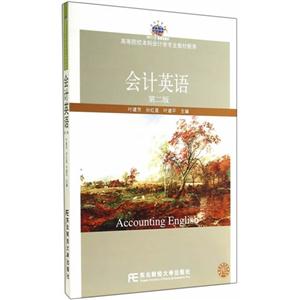会计英语-第二版
本书特色
[
本书根据会计英语的读者一般具有一定的专业知识的特点,集教材与工具用书于一体,从会计等式出发,结合企业的经营活动,完整介绍了借贷记账法下的会计循环程序,包括企业分析、序时日记账填制、过入总分类账、期末账项调整、结账和财务报表编制等;并按资产、负债和权益要素,介绍了现金、短期投资和应收款项、存货和销售成本、长期投资、固定资产和无形资产、流动及非流动负债、股东权益等的会计处理要点,介绍了现金流量表的性质和编制方法,并提供了中英文对照的财务报表附注及各纳税申报表,同时根据我国会计准则建设与国际会计准则趋同的*新情况以及“营改增”的*新变化,做了及时修订,系统阐述了国际会计准则下的财务报表编报框架以及财务信息质量特征。本书可作为普通高等院校的教学用书,也可供会计专业人员自学使用,还可作为工具书使用。
]
目录
chapter 1 an introduction to accounting 1.1 accounting is an information system 1.2 forms of organization 1.3 the framework for the preparation and presentation of financial statements 1.4 understanding of financial statements 1.5 accounting and its profession 1.6 accounting elements and using the accounting equation 1.7 professional ethics in accounting 1.8 convergence of accounting standards chinese accounting standards: development and implementation vocabulary self—test questions exercises answers to self—test questionschapter 2 accounting cycle 2.1 t—account and debit & credit 2.2 journalizing and posting transactions 2.3 preparing a trial balance 2.4 adjusting the accounts 2.5 adjusted trial balance and preparation of financial statements 2.6 the worksheet 2.7 closing 2.8 the accounting cycle summary 2.9 classification of balance sheet items vocabulary self—test questions exercises answers to self—test questionschapter 3 current assets 3.1 cash 3.2 trading securities 3.3 notes receivable 3.4 accounts receivable 3.5 inventories vocabulary self—test questions exercises answers to self—test questionschapter 4 non—current assets 4.1 fixed assets 4.2 natural resources 4.3 intangible assets 4.4 impairment of fixed assets 4.5 long—term investments 4.6 impairment of long—term investments vocabulary self—test questions exercises answers to self—test questionschapter 5 liabilities 5.1 current liabilities 5.2 non—current liabilities vocabulary self—test questions exercises answers to self—test questionschapter 6 owners’ equity 6.1 forms of organization 6.2 stockholders’ rights 6.3 accounting for stock issues 6.4 treasury stock 6.5 preferred stock 6.6 dividends and stock splits 6.7 accounting for retained earnings 6.8 statement presentation and analysis vocabulary self—test questions exercises answers to self—test questionschapter 7 revenue and expense recognition and income statement presentation 7.1 revenue recognition concepts 7.2 revenue recognition at delivery 7.3 revenue recognition before delivery 7.4 revenue recognition after delivery 7.5 long—term contracts 7.6 revenue recognition for service sales 7.7 recognition of gains and losses 7.8 expense recognition 7.9 presentation of the income statement vocabulary self—test questions exercises answers to self—test questionschapter 8 statement of cash flows and financial statement analysis 8.1 cash and cash equivalents 8.2 classification of cash receipts and cash payments 8.3 preparing statement of cash flows——direct method 8.4 preparing statement of cash flows——indirect method 8.5 determining cash flows from investing activities 8.6 determining cash flows from financing activities 8.7 presenting the information in the form of the statementof cash flows 8.8 usefulness of the statement of cash flows 8.9 financial statement analysis: horizontal and vertical 8.10 ratio analysis vocabulary self—test questions exercises answers to self—test questionsappendix 1.balance sheet 2.income statement 3.statement of changes in owners’ equity 4.statement of cash flows 5.the disclosure of supplementary information to statement of cash flows 6.disclosure of information and accounts required 7.vat return form 8.consumption tax return form 9.business tax return form 10.annual return form of the people’ s republic of china on corporate income tax 11.individual income tax return form
封面

书名:会计英语-第二版
作者:叶建芳
页数:272
定价:¥28.0
出版社:东北财经大学出版社
出版日期:2014-08-01
ISBN:9787565416651
PDF电子书大小:52MB 高清扫描完整版
